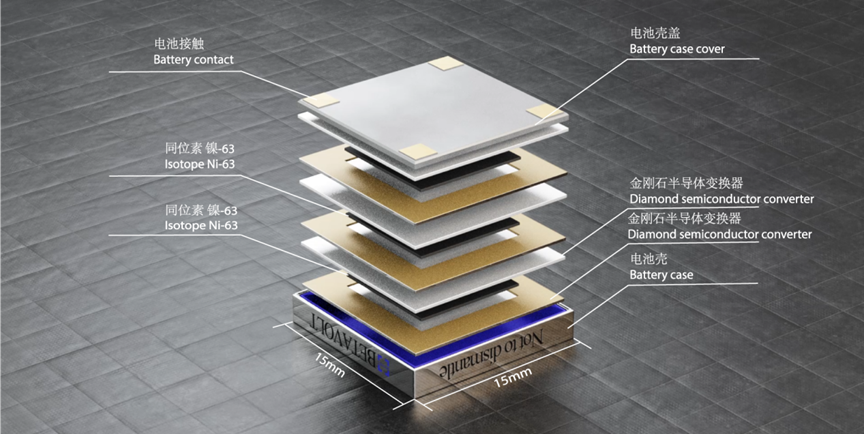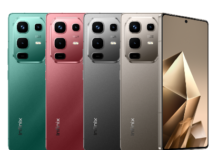Not a lifespan of 50 years, but a discharge time of 50 years. It is called the BV100 by Betavolt. It is a nuclear battery that could potentially power devices like smartphones and drones for up to 50 years without the need for recharging. The battery, named BV100, utilizes a combination of a nickel-63 radioactive isotope and a 4th-generation diamond semiconductor to generate electricity through the decay of isotopes.
Revolutionary Technology
Betavolt’s BV100 is not the first nuclear battery, but it represents a significant leap forward in terms of miniaturization and potential applications.

Unlike traditional radio-thermal generators, the BV100 employs diamond layers doped with radioactive isotopes, specifically nickel-63 in this case, to harness the energy released by beta particles during the isotope’s decay process. The thin, single-crystal diamond semiconductors efficiently convert this energy into a usable electric current.
Compact Design and Impressive Power
Measuring a mere 15 x 15 x 5 mm, smaller than a coin, the BV100 boasts a power output of 100 microwatts at 3 volts. Betavolt envisions a future where these batteries could power smartphones indefinitely or keep small drones in the air continuously. The design includes the ability to stack or link multiple unit modules for increased current output.
Safety Measures and Environmental Impact
To address radiation concerns, Betavolt has incorporated a protective case around the BV100 to shield against radiation exposure and physical damage. The company assures that the radioisotopes, such as nickel-63, pose minimal environmental risk. Following the decay period, the isotopes transform into stable, non-radioactive elements, eliminating concerns about pollution or environmental harm.
Scientific Skepticism and Future Prospects
Despite the ambitious claims made by Betavolt, some experts, like Juan Claudio Nino, a materials scientist at the University of Florida, express skepticism. Nino points out the relatively low power output of the BV100, suggesting it may be suitable for devices like pacemakers or passive wireless sensors but not sufficient to power a cell phone in its current form.
Betavolt, however, remains optimistic about the technology’s potential. The company plans to launch a larger one-watt version in 2025, aiming to address the power requirements of standard cell phones. In the meantime, they suggest combining multiple BV100 batteries in parallel to enhance power delivery to devices.
Global Competition and Safety Assurance
Betavolt faces competition in the race to develop nuclear batteries, with Australian company PhosEnergy also exploring ultra-long-life batteries. While Betavolt believes its technology puts China ahead in this arena, concerns about public policy and safety regulations, particularly regarding beta radiation, may impact the widespread adoption of these nuclear batteries.
Future Outlook
The development of Betavolt’s BV100 represents a significant stride toward revolutionizing electronic devices by eliminating the need for traditional chargers and portable power banks. If successfully mass-produced and adopted, these nuclear batteries could usher in an era of continuous device operation, from smartphones to drones, fundamentally transforming the way we perceive and use electronic devices.













































